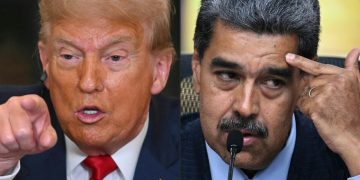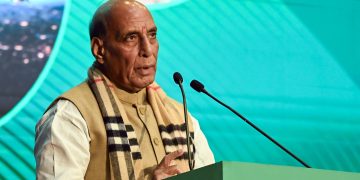Piyush Roy
Mohandas Karamchand Gandhi, undisputedly is the most adapted modern political leader on the Indian screen. If in the pre-and-post independence era, his slogans and ideas inspired films like Kismet (1943), Jagriti (1954),and the like, Richard Attenborough’s epic biopic of the 1980s, Gandhi (1982), marked an unforgettable global debut for his character counterpart on the big screen. But the next memorable Bollywood film to explore ‘Gandhian’ ideals to impactful critical and commercial success, happened only a decade ago, with Rajkumar Hirani’s Lageraho Munnabhai (2006). The film’s fun loving, ‘prankster’ Bapu may have been a product of its protagonist’s chemical locha in the brain, but it definitely made Gandhi and ‘Gandhigiri’popular among the post freedom, Generation X. Before that, Gandhi the ‘politician’, had been subject to some not so favourable scrutiny, in other leader biopics, especially Dr. Babasaheb Ambedkar(2000) and The Legend of Bhagat Singh (2002). Fair enough, a democratic country, is supposed to guarantee aesthetic freedom and safeguard all point-of-views so long it’s within constructive dissent.
So what is it that makes the ‘father of the modern Indian nation’, a forever lure, nearly seven decades since his passing away? Talking idea and influence, it’s been fairly accepted that India’s most influential exports to the human civilisation in the last two millennia, still remain Buddha and Gandhi. Not surprisingly many of their socio-egalitarian ideals overlapped, though the nature and context of their struggles varied. As regards the many films inspired by these icons, a lot still awaits adaptation and imaginative onscreen exploration, beyond review sweeps of the big events in their lives.
Gandhi My Father (2007), a tragic story, based on the tumultuous relationship of hurt and angst, shared between Gandhi and his eldest son, Harilal Gandhi, was a worthy dare in this direction. For once, a story featuring the Mahatma, had gone beyond the headlines of history, to offer a peep into the private trials of a parent. Wish someone explored his householder’s life, especially teenager Gandhi’s early married life to child bride Kasturba, with a strong mind of her own.

The greatest advantage for any screenplay writer on any aspect of Gandhi’s private life are his own valuable and voluble first hand notes, featuring the mundane in much more nitty-gritty that the larger events he triggered.
Gandhi’s grandson, Arun Gandhi, who calls himself a ‘peace farmer’, was recently in Edinburgh for a public address, focussing on lived stories of ‘lesson learning’that he had experienced as a teenager in his grandfather’s home school in the Sabarmati ashram. I was invited to a small, and intimate roundtable discussion with Arun Gandhi,along with select representatives of the Edinburgh city community, Scottish Government, Education and NGO sectors, organised by the Edinburgh Peace and Justice Centre. The focus was on how to integrate peace and non-violence discourses into school and universitycurriculums to create and nurture future ‘peace makers’. The challenges have been mounting, given the rise of an all-pervasive culture that glamorises violence through every impressionable attraction– media, films, and now video games. So are the good old ‘moral science’ classes a worthy counter still?
Arun Gandhi suggested that, ‘Values, ethics and life skills should be made compulsory subjects. Methods to avoid conflict should also be discussed, along with the trainings in conflict resolution. Compassion and not pity, should be the basis for charity, attitudes of ‘us’ and ‘them’ should be eliminated from all discourses on world amity, and every new idea or argument should be presented in a way that others can hear it too, instead of just listening to it…’ In brief, he emphasised on how best to deliver a message that it reaches the widest audience across class, knowledge and thinking ability levels.
Simple stories told well could be an option, especially if shared from the lived lives of icons from relatable memory. It is these stories from various stages of Gandhi’s life that our big and small screen storytellers could think of tapping into, this Gandhi Jayanti. Arun Gandhi shared one that had shaped and changed his life forever.
Once Arun and his dad Manilal Gandhi (the second son of the Mahatma), who stayed in South Africa, went on a day’s outing to a town, 18 miles away from their Tolstoy Farm home, which had been set up by his grandfather. Manilal wasn’t feeling well that day, and Arun was more than eager to drive the car. On reaching their destination, Manilal asked Arun to pick him up at five in the evening. The car needed some repairs. Arun took it to the garage and went for a double movie screening featuring films of Hollywood star John Wayne. So carried away, was the young lad by the engaging spectacle that he forgot to pick up his dad. The film got over at 5.30pm, and by the time he collected the car from the garage and reached his dad’s meeting venue, it was already six in the evening. On being asked about the delay, Arun blamed it on the garage owner, little knowing that his anxious father had already checked with the latter. Manilal was saddened by his son’s lie, but he didn’t scold him. He instead decided to undergo a penance punishment, because he thought that it was his failure as a father that his son couldn’t muster the courage to tell him the truth. After a long day of work and meetings, and in spite of being tired, he walked the 18 miles home, in the dark, through bad village roads, and dense sugarcane fields. Arun had no option but to follow his father, slowly behind,in the car. As tears of remorse ran down his eyes, he swore to himself, that never ever, would he lie in his life again…
It was a promise made to himself, and he has kept it all along. Had his father punished Arun that day, the impact would have stayed as long as the physical manifestation of the pain. And like every naughty kid, he would have devised a better excuse to not get caught the next time. But by taking the punishment on himself, and practising the lessons of ‘non-violent parenting’, inculcated from the sacrificial penances of his father Mohandas Gandhi, when he and his brothers erred, Manilal, ensured that the lesson of ‘truth for life’ was inculcated in his son, for life as well.
The Gandhi family story abounds with many such inspiring lessons, beyond the tragic drama involving his eldest son Hiralal, last seen on screen. For starters, how about a children’s film with lesson takeaways for adults, exploring the many innovative ‘non-violent’ disciplinary methods that Gandhi ‘experimented’ to make ‘men’ out of the vanar senain his Sabarmati ashram…






































